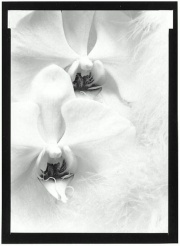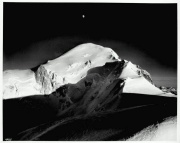Difference between revisions of "Selenium"
Jump to navigation
Jump to search
m (Text replace - "== Authority ==" to "== Sources Checked for Data in Record ==") |
|||
| (2 intermediate revisions by 2 users not shown) | |||
| Line 1: | Line 1: | ||
| − | [[File:1980.331-E6251.jpg|thumb|]] | + | [[File:1980.331-E6251.jpg|thumb|Selenium toned print<br>MFA# 1980.331]] |
== Description == | == Description == | ||
| − | A nonmetallic, powdery red element. Selenium was first identified by Jons Jakob Berzelius, a Swedish chemist, in 1817. Its abundance in the earth's crust is about 0.09 ppm with highest concentrations occurring in Vesuvian [ | + | A nonmetallic, powdery red element. Selenium was first identified by Jons Jakob Berzelius, a Swedish chemist, in 1817. Its abundance in the earth's crust is about 0.09 ppm with highest concentrations occurring in Vesuvian [[lava|lavas]] and volcanic [[tuff|tuff]]. Selenium is usually found in the sulfide ores of heavy metals and is obtained primarily as a by-product in [[copper|copper]] refining. It is used in photographic toning baths for silver prints and in the manufacture of red and pink [[glass|glass]] and [[glaze|glazes]]. Selenium is also used in electronics, cameras, photocells, solar batteries, light meters, and television screens. |
| − | [[File:1999.416-SC9447.jpg|thumb|]] | + | [[File:1999.416-SC9447.jpg|thumb|Selenium toned print<br>MFA# 1999.416]] |
== Synonyms and Related Terms == | == Synonyms and Related Terms == | ||
Se; sélénium (Fr.); Selen (Deut.); selenio (It., Esp.); Selênio (Port.); Selen (Sven.) | Se; sélénium (Fr.); Selen (Deut.); selenio (It., Esp.); Selênio (Port.); Selen (Sven.) | ||
| − | == | + | == Risks == |
| − | + | * Ingestion, inhalation and contact may cause irritation, nausea and burns. | |
| + | * Combustible, burns in air. | ||
| + | * ThermoFisher: [https://www.fishersci.com/store/msds?partNumber=AC419271000&productDescription=SELENIUM+%28POWDER%2C+-325+M+100GR&vendorId=VN00032119&countryCode=US&language=en SDS] | ||
| − | Flame color is blue and smells of horseradish. | + | ==Physical and Chemical Properties== |
| + | |||
| + | * Soluble in dilute alkalis and potassium cyanide solutions. | ||
| + | * Flame color is blue and smells of horseradish. | ||
{| class="wikitable" | {| class="wikitable" | ||
| Line 24: | Line 29: | ||
|- | |- | ||
! scope="row"| Melting Point | ! scope="row"| Melting Point | ||
| − | | 217 | + | | 217 C |
|- | |- | ||
! scope="row"| Density | ! scope="row"| Density | ||
| − | | 4.5 | + | | 4.5 g/ml |
|- | |- | ||
! scope="row"| Molecular Weight | ! scope="row"| Molecular Weight | ||
| Line 33: | Line 38: | ||
|- | |- | ||
! scope="row"| Boiling Point | ! scope="row"| Boiling Point | ||
| − | | 685 | + | | 685 C |
|} | |} | ||
| − | == | + | ==Resources and Citations== |
| − | |||
| − | |||
| − | |||
| − | |||
| − | |||
| − | |||
| − | |||
| − | |||
| − | + | * Web Elements: [http://www.webelements.com/webelements/elements/text/Se/key.html Website] | |
* ''Chemical & Engineering News'', American Chemical Society, Washington DC, 81 (36) , Sept. 8, 2003 Comment: by Liu Tungsheng; selenium discovered in 1817 by Jons Jakob Berzelius | * ''Chemical & Engineering News'', American Chemical Society, Washington DC, 81 (36) , Sept. 8, 2003 Comment: by Liu Tungsheng; selenium discovered in 1817 by Jons Jakob Berzelius | ||
| Line 64: | Line 61: | ||
* ''The American Heritage Dictionary'' or ''Encarta'', via Microsoft Bookshelf 98, Microsoft Corp., 1998 Comment: Baron Berzelius, a Swedish chemist | * ''The American Heritage Dictionary'' or ''Encarta'', via Microsoft Bookshelf 98, Microsoft Corp., 1998 Comment: Baron Berzelius, a Swedish chemist | ||
| − | * | + | * Photographic Chemicals: www.jetcity.com/~mrjones/chemdesc.htm |
* Art and Architecture Thesaurus Online, http://www.getty.edu/research/tools/vocabulary/aat/, J. Paul Getty Trust, Los Angeles, 2000 | * Art and Architecture Thesaurus Online, http://www.getty.edu/research/tools/vocabulary/aat/, J. Paul Getty Trust, Los Angeles, 2000 | ||
Latest revision as of 13:56, 30 May 2022
Description
A nonmetallic, powdery red element. Selenium was first identified by Jons Jakob Berzelius, a Swedish chemist, in 1817. Its abundance in the earth's crust is about 0.09 ppm with highest concentrations occurring in Vesuvian lavas and volcanic Tuff. Selenium is usually found in the sulfide ores of heavy metals and is obtained primarily as a by-product in Copper refining. It is used in photographic toning baths for silver prints and in the manufacture of red and pink Glass and glazes. Selenium is also used in electronics, cameras, photocells, solar batteries, light meters, and television screens.
Synonyms and Related Terms
Se; sélénium (Fr.); Selen (Deut.); selenio (It., Esp.); Selênio (Port.); Selen (Sven.)
Risks
- Ingestion, inhalation and contact may cause irritation, nausea and burns.
- Combustible, burns in air.
- ThermoFisher: SDS
Physical and Chemical Properties
- Soluble in dilute alkalis and potassium cyanide solutions.
- Flame color is blue and smells of horseradish.
| Composition | Se (atomic no. 34) |
|---|---|
| CAS | 7782-49-2 |
| Melting Point | 217 C |
| Density | 4.5 g/ml |
| Molecular Weight | atomic wt = 78.96 |
| Boiling Point | 685 C |
Resources and Citations
- Web Elements: Website
- Chemical & Engineering News, American Chemical Society, Washington DC, 81 (36) , Sept. 8, 2003 Comment: by Liu Tungsheng; selenium discovered in 1817 by Jons Jakob Berzelius
- Richard S. Lewis, Hawley's Condensed Chemical Dictionary, Van Nostrand Reinhold, New York, 10th ed., 1993
- Van Nostrand's Scientific Encyclopedia, Douglas M. Considine (ed.), Van Nostrand Reinhold, New York, 1976
- G.S.Brady, Materials Handbook, McGraw-Hill Book Co., New York, 1971 Comment: Brady p.696
- Michael McCann, Artist Beware, Watson-Guptill Publications, New York City, 1979
- Random House, Webster's Encyclopedic Unabridged Dictionary of the English Language, Grammercy Book, New York, 1997
- The Merck Index, Martha Windholz (ed.), Merck Research Labs, Rahway NJ, 10th edition, 1983 Comment: entry 8572
- The American Heritage Dictionary or Encarta, via Microsoft Bookshelf 98, Microsoft Corp., 1998 Comment: Baron Berzelius, a Swedish chemist
- Photographic Chemicals: www.jetcity.com/~mrjones/chemdesc.htm
- Art and Architecture Thesaurus Online, http://www.getty.edu/research/tools/vocabulary/aat/, J. Paul Getty Trust, Los Angeles, 2000

